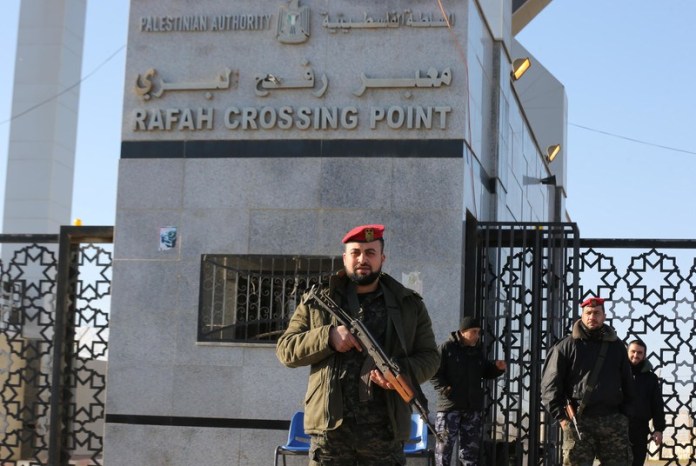Abbas tightens Israel’s siege of Gaza

It didn’t take long for the vise on Gaza’s long-suffering population to be tightened in the new year
The Palestinian Authority, headed by Mahmoud Abbas in the occupied West Bank, withdrew its personnel from the Rafah border crossing between Gaza and Egypt overnight Sunday.
The move amounts to the effective closure of the sole point of exit and entry for the vast majority of Gaza’s more than two million residents.
Hamas authorities have resumed control over the Gaza side of the crossing, after having handed it over to the Palestinian Authority last November, but it is unclear whether Egypt will reopen Rafah.
The High Commission for the March of Return and Breaking the Siege called on the PA to immediately reverse its decision and implored Egypt to intervene to ensure Rafah’s continued operation.
Gisha, an Israeli group which monitors the closure on Gaza, stated that the opening of Rafah earlier last year “has provided a vital lifeline for Gaza to the outside world. It must remain open.”
Rafah crossing had been permanently opened for travel in both directions since July 2018, and consistently in operation for two months before that. Prior to May last year, it had been closed with only rare exception since late 2014.
Yet movement for Palestinians traveling to and from Gaza is not easy, even when Rafah is open.
“Despite the almost continuous operation of the crossing, access of people through it has been delayed and impeded for a range of reasons, including unclear criteria for the selection of travelers allowed to cross every day,” according to the United Nations Office for the Coordination of Humanitarian Affairs.
The only other crossing for travelers in Gaza is Erez checkpoint, which is controlled by Israel.
Fatah supporters summoned in Gaza
The Palestinian Authority said that it had withdrawn its personnel due to Hamas authorities in Gaza “obstructing” their work.
Since Friday, the Internal Security Apparatus in Gaza has summoned some 200 people, most of them members and leaders of the Fatah party, rivals to Hamas and the dominant faction in the Palestinian Authority.
Four among those summoned were journalists, three of them affiliated with Fatah, according to the Gaza-based human rights group Al Mezan.
“Some of those summoned informed Al Mezan that they were warned against joining any activities planned for 7 January 2019 in celebration of the anniversary of Fatah’s founding,” the rights group stated.
Ahmad al-Louh, a radio correspondent, was “forced to sign a pledge not to publish anything about Fatah.”
Mezan, while decrying politically motivated arbitrary detention, stated that a ban on coverage of Fatah anniversary celebrations “is particularly concerning as it marks a blatant violation of the freedom of [the] press.”
Unknown assailants meanwhile attacked the headquarters of the Palestinian Authority-affiliated Palestinian Broadcasting Corporation in Gaza City on Friday.
Five persons “carrying knives, sticks and other weapons” destroyed cameras and editing and broadcasting equipment, the Committee to Protect Journalists stated.
Authorities in Gaza arrested five suspects the following day. According to news reports cited by the Committee to Protect Journalists, the suspects were former PA employees whose salaries were recently suspended.
Gaza patients pay price for PA sanctions
Meanwhile, medical patients continue to pay the price for Palestinian Authority sanctions imposed on Gaza in early 2017, including freezing and denying funding for treatment in the West Bank and Israel.
The quality of healthcare services in Gaza has declined following a decade of Israeli blockade, necessitating referrals outside the territory.
Patients “must navigate … a rigorous maze of opaque rules and policies” to seek care in the West Bank and Israel, according to Al Mezan.
“In order to access these hospitals, patients – with Palestinian Authority-approved hospital referrals and appointments – must obtain exit permits from the Israeli security authorities,” the rights group stated.
Around half the time patients are denied permits or are excessively delayed.
“While the vast majority of obstacles that patients and their families face – including exacerbated health conditions and in the gravest cases, death – are the result of the Israeli government’s restrictions on patients’ access to medical care, the PA’s engagement in this system has served to inflame the conditions.”
Sixteen patients, 11 of them children, died between mid-2017 and mid-2018 after their care was delayed by the Palestinian Authority, according to Al Mezan.
The group points to “a diminishing number of referrals being successfully processed” and dwindling quantities of medical supplies and medicines being delivered to Gaza, resulting in the suspension of chemotherapy in August.
Funding for PA forces in jeopardy
The Palestinian Authority faces a crisis of its own as a government shutdown in the US narrows the opportunity for officials in that country to amend a bill signed into law by Donald Trump in October.
The Anti-Terrorism Clarification Act of 2018 would disqualify the PA from receiving US aid “unless it agrees to pay court judgments of sometimes up to hundreds of millions of dollars on behalf of American victims of Palestinian attacks,” according to the Associated Press.
The law will effectively prevent the transfer of funds for Palestinian Authority security forces when it goes into effect at the end of this month.
The Trump administration was “scrambling” to preserve this aid after realizing it would be threatened by the new law.
US aid to PA security forces amounted to $61 million last year alone, according tothe AP.
Trump’s White House slashed half a billion in aid to Palestinians in 2018 to punish the Palestinian Authority leadership for protesting its move of the US embassy to Jerusalem.
Source: Palestinow

WRITE YOUR COMMENT